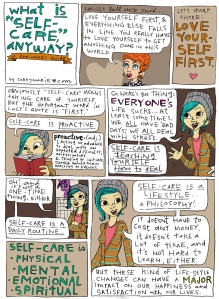Something that can be really difficult when you’re stressed or depressed is motivating yourself to perform your daily activities, or to do more than you have to do each day. A demanding schedule or a job you don’t like can leave you feeling drained and unmotivated to try and improve your outlook on life or to participate in activities you once enjoyed. This can be particularly difficult if you don’t have anyone around to make sure you’re doing what you’re supposed to be doing, as vlogger Jessica Harlow discusses in this video. In my personal experience, I found this very difficult when I first moved out of home and went to university at age 17-18. My life had a sudden lack of structure and I had no one around to make sure I was doing what I was supposed to be doing, and to stop me from things I shouldn’t have been doing. Then, of course, it would always come around to bite me in the butt when I was panicking at last minute assignments or some important thing I had forgotten to do/stuffed up.
Over time, people learn from experiences like this, but it can be a difficult change to make. Some good ways to start learning to organise yourself can be things such as weekly planners, to do lists, daily schedules and ‘rewarding’ yourself for completing things on time and doing study. Reachout also has a great app to help you “get sh!t sorted”, which I think is a big help for anyone at university!





